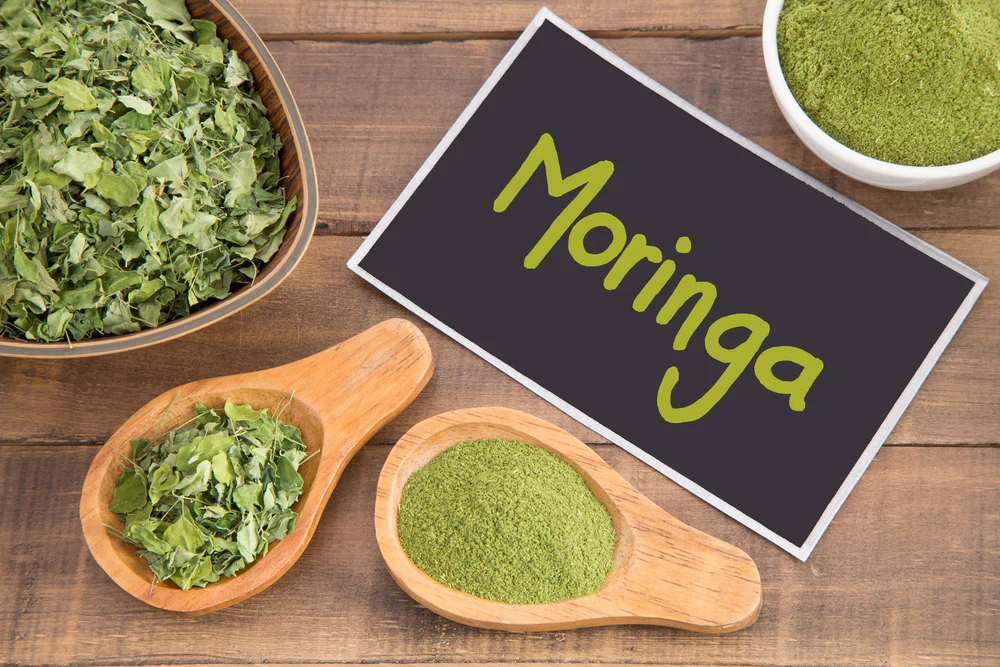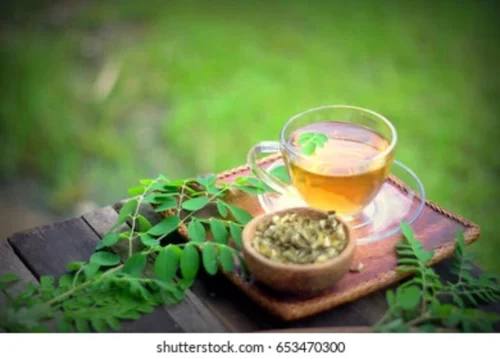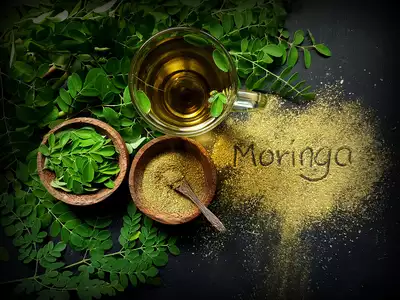In today’s fast-paced world, finding natural and effective ways to enhance our health and vitality is more important than ever. Organic Moringa superfood powder is a powerhouse of nutrients that promises not just to nourish your body but also to revitalize your energy levels, making it an essential addition to your daily diet.
Introduction to Organic Moringa Superfood Powder
Moringa Oleifera, commonly known as Moringa, is a tree native to parts of Africa and Asia. It’s renowned for its nutrient-rich leaves, which are transformed into a potent powder form. This green superfood is packed with vitamins, minerals, antioxidants, and bioactive compounds, offering a range of health benefits.
Nutritional Profile of Moringa
Vitamins and Minerals
- Vitamin A: Moringa is a potent source of Vitamin A, essential for healthy vision, immune function, and skin health.
- Vitamin C: With a high Vitamin C content, it surpasses even oranges in its ability to support the immune system and fight off infections.
- Vitamin E: Known for its antioxidant properties, Vitamin E in Moringa helps combat oxidative stress and protect the body’s cells.
- Calcium: Moringa leaves contain more calcium than milk, which is vital for strong bones and teeth, muscle function, and nerve signaling.
- Iron: Rich in iron, Moringa helps in combating anemia and boosting the body’s energy levels.
- Magnesium: Essential for over 300 biochemical reactions in the body, magnesium in Moringa supports muscle and nerve function, blood glucose control, and blood pressure regulation.

Protein and Amino Acids
- Protein: Moringa is a rare plant source of complete protein, containing all nine essential amino acids necessary for human health, making it an excellent protein source for vegetarians and vegans.
Antioxidants and Bioactive Compounds
- Chlorogenic Acid: This powerful antioxidant, also found in high amounts in coffee, can help moderate blood sugar levels after meals.
- Quercetin: Known for its ability to lower blood pressure, quercetin is another key antioxidant found in Moringa.
- Beta-Sitosterol: A plant sterol with cholesterol-lowering properties, beta-sitosterol also supports heart health.
Fiber
- Dietary Fiber: Moringa leaves are a good source of fiber, promoting digestive health and contributing to a feeling of fullness, which can help with weight management.
Anti-inflammatory Compounds
The isothiocyanates in Moringa are anti-inflammatory compounds that are shown to help reduce inflammation in the body, potentially lowering the risk of chronic diseases such as heart disease, diabetes, and arthritis.
Overall Benefits
This rich blend of vitamins, minerals, antioxidants, and bioactive compounds makes Moringa an excellent nutritional supplement. Its comprehensive nutrient profile supports a wide range of health benefits, including enhanced energy levels, improved immune function, better digestive health, and a reduced risk of many health issues.
Health Benefits of Moringa Superfood Powder
1. Boosts Immune System
Moringa powder is rich in Vitamin C, which plays a crucial role in bolstering the immune system and fighting viral and bacterial infections. Its natural antibacterial, antifungal, and antimicrobial properties enhance the body’s resistance against various pathogens.
2. Enhances Energy Levels
Thanks to its high iron content, Moringa powder helps in improving energy levels. Iron is essential for the formation of hemoglobin, which is responsible for transporting oxygen in the blood, thus reducing fatigue and enhancing stamina.
3. Supports Weight Management
Moringa powder can be an effective ally in weight loss efforts due to its low-fat content and high dietary fiber, which helps in keeping you full longer. Moreover, it has been shown to help in reducing fat accumulation in the body.
4. Improves Skin and Hair Health
The high antioxidant content in Moringa powder protects the skin against free radicals, reducing visible signs of aging. Vitamins A and E, along with other nutrients, contribute to healthy, glowing skin and strong, resilient hair.
5. Promotes Heart Health
Moringa powder contains powerful antioxidants such as quercetin, which can help lower blood pressure, and beta-sitosterol, known to regulate cholesterol levels. These compounds together support cardiovascular health.
6. Regulates Blood Sugar Levels
Chlorogenic acid present in Moringa powder can help in moderating blood sugar levels after meals, making it beneficial for people with diabetes. It also helps in improving insulin sensitivity.
7. Supports Digestive Health
The fiber content in Moringa powder aids in promoting a healthy digestive system, preventing constipation, and maintaining a healthy gut flora. It also has isothiocyanates, which have been shown to help the body fight against ulcers.
8. Anti-inflammatory Effects
Moringa has natural anti-inflammatory properties due to the presence of isothiocyanates. Chronic inflammation is linked to numerous health conditions, and regular consumption of Moringa can help reduce this risk.
9. Improves Bone Health
Rich in calcium and phosphorus, Moringa powder helps in maintaining strong and healthy bones. It can be particularly beneficial for growing children and older adults at risk of osteoporosis.
10. Enhances Brain Health
Moringa’s high antioxidant levels can also contribute to better brain health. It has been linked to enhanced memory, reduced brain fog, and lower risks of neurodegenerative diseases due to its neuroprotective properties.
11. Detoxifies the Body
Moringa powder is known for its detoxifying effects, thanks to its ability to purify water and remove impurities from the body, promoting overall well-being.
12. Supports Eye Health
The high levels of Vitamin A in Moringa powder not only improve skin health but are also crucial for maintaining healthy vision and reducing the risk of age-related eye issues.
How to Incorporate Moringa into Your Diet
1. Smoothies and Juices
Adding a teaspoon or two of Moringa powder to your morning smoothie or juice is one of the easiest ways to incorporate it into your diet. Its mild taste blends well with most ingredients, enriching your drink with vitamins, minerals, and antioxidants without altering the flavor significantly.
2. Teas and Beverages
You can make a simple Moringa tea by stirring a half to one teaspoon of Moringa powder into hot water. For a more flavorful beverage, add lemon, honey, or ginger. Moringa can also be mixed into your favorite herbal teas or even into warm milk or plant-based alternatives before bedtime.
3. Soups and Salads
Sprinkle Moringa powder over salads for a nutrient boost or stir it into salad dressings. It can also be added to soups and stews, where it acts as a thickening agent while enriching your meals with its health-promoting properties.
4. Baking
Incorporate Moringa powder into your baking recipes. It can be added to bread, muffins, cookies, or pancakes, enhancing the nutritional value of your baked goods. Substitute a small portion of the flour with Moringa powder in your favorite recipes.
5. Cooking
Moringa powder can be used as a seasoning for dishes such as pasta, rice, or vegetables. It can be mixed into sauces and gravies or used as a rub for meats. Its versatility in cooking is vast, allowing for creativity in the kitchen.
6. Energy Bars and Balls
For a quick and healthy snack, add Moringa powder to homemade energy bars or balls. Combine it with ingredients like oats, nuts, seeds, and dried fruits, and bind them together with honey or syrup.
7. Yogurt and Breakfast Bowls
Stir Moringa powder into your morning yogurt or oatmeal for an extra boost of nutrients. It can also be sprinkled over cereal or added to breakfast bowls that include a mix of fruits, nuts, and seeds.
8. Smoothie Bowls
Elevate your smoothie bowls by blending Moringa powder into the base mixture. Top with slices of fresh fruit, granola, coconut flakes, and a drizzle of honey for a nutritious and satisfying meal.
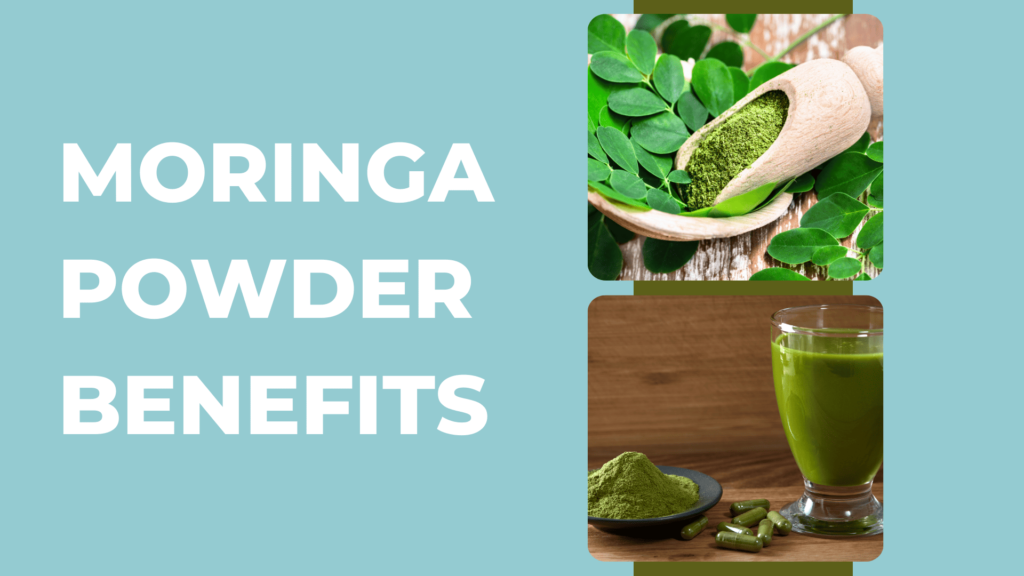
Tips for Incorporating Moringa into Your Diet:
- Start Small: Begin with a small amount of Moringa powder to assess your tolerance and gradually increase as desired.
- Quality Matters: Choose high-quality, organic Moringa powder to ensure you’re getting a product free from contaminants and with the highest nutrient content.
- Store Properly: Keep Moringa powder in a cool, dry place away from direct sunlight to preserve its nutritional properties.
Comparing Organic vs. Non-Organic Moringa Powder
1. Cultivation Practices
- Organic Moringa Powder: Organic Moringa is grown without the use of chemical pesticides, herbicides, or synthetic fertilizers. Organic farming practices emphasize the use of natural methods to maintain soil health and control pests and diseases, ensuring the sustainability of the cultivation process.
- Non-Organic Moringa Powder: Non-organic Moringa may be cultivated using conventional farming practices, which can include the use of chemical pesticides and synthetic fertilizers. These substances can accumulate in the soil and potentially in the Moringa leaves themselves.
2. Chemical Residues
- Organic Moringa Powder: Being grown without harmful chemicals means that organic Moringa powder is less likely to contain pesticide residues, making it a cleaner and potentially safer option for consumption.
- Non-Organic Moringa Powder: There’s a higher possibility of chemical residue presence in non-organic Moringa powder. Even though these levels are generally considered safe by regulatory standards, some consumers prefer to avoid these residues altogether.
3. Nutritional Content
- Organic Moringa Powder: Some studies suggest that organic plants may have higher levels of certain nutrients, including antioxidants, due to the stresses of organic cultivation methods. However, the difference in nutrient content between organic and non-organic Moringa powder can vary and is not always significant.
- Non-Organic Moringa Powder: Non-organic Moringa still retains the high nutritional value characteristic of the plant, including vitamins, minerals, and protein, although the levels of certain beneficial compounds might slightly differ compared to organic varieties.
4. Environmental Impact
- Organic Moringa Powder: Organic farming practices are generally more environmentally friendly. They aim to reduce pollution and conserve water and soil quality, contributing to biodiversity.
- Non-Organic Moringa Powder: Conventional farming practices can have a greater negative impact on the environment, including potential soil degradation, water contamination, and a decrease in biodiversity due to the use of chemical inputs.
5. Cost
- Organic Moringa Powder: Organic products typically cost more due to the more labor-intensive methods of organic farming and the costs associated with organic certification. This higher price can be a consideration for some consumers.
- Non-Organic Moringa Powder: Non-organic Moringa powder is often less expensive than its organic counterpart, making it more accessible to a wider audience.
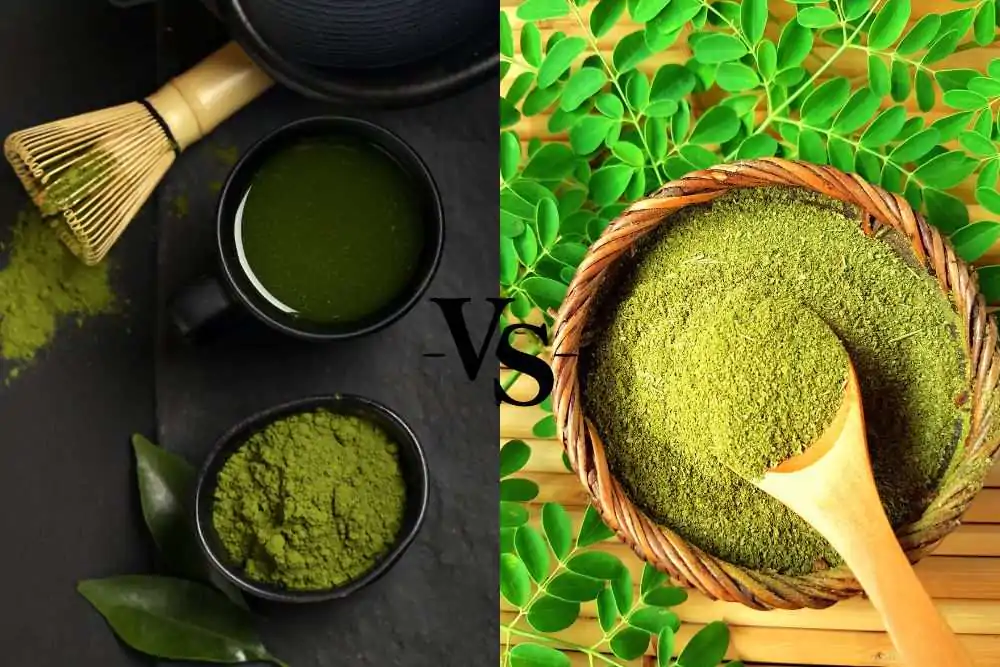
Choosing the Right Moringa Powder
1. Organic Certification
Opt for Moringa powder that is certified organic. This certification ensures that the product has been grown without the use of synthetic pesticides and fertilizers, genetically modified organisms (GMOs), and other artificial additives. Organic certification is a good indicator of quality and safety.
2. Source
The origin of the Moringa powder is important. Moringa grown in its native environments (parts of Africa, India, and Southeast Asia) is likely to have a richer nutrient profile due to the ideal growing conditions in these regions. Look for products that clearly state where the Moringa is sourced from.
3. Processing Method
The way Moringa leaves are processed into powder can significantly affect its nutritional value. The best Moringa powder is made using a low-temperature, shade-dried process to preserve the delicate nutrients. Avoid products that do not specify the processing method or use high temperatures, which can degrade the powder’s quality.
4. Purity
Check the ingredient list to ensure that the product contains 100% Moringa powder with no fillers, additives, or preservatives. Pure Moringa powder should be green in color, indicating that it’s made from the leaves and not other parts of the plant that are less nutrient-dense.
5. Lab Testing for Contaminants
Reputable brands often conduct third-party lab testing to check for heavy metals, bacteria, and other potential contaminants. Look for products that have undergone such testing and provide transparent results, ensuring that you’re consuming a safe and clean product.
6. Packaging
Choose Moringa powder that comes in airtight, opaque packaging to protect it from light and moisture, which can degrade its quality over time. Packaging that ensures the product’s freshness until its best-before date is preferable.
7. Brand Reputation and Reviews
Research the brand’s reputation and read customer reviews. Brands with a commitment to quality and ethical practices are more likely to produce high-quality Moringa powder. Customer reviews can provide insights into the product’s effectiveness and any potential issues.
8. Price
While price shouldn’t be the sole factor in your decision, it’s worth considering. Extremely low-priced products may be indicative of lower quality or unethical production methods. However, the most expensive option isn’t necessarily the best. Look for a product that offers a good balance between cost and quality.
9. Taste and Color
High-quality Moringa powder should have a bright green color and a mild, earthy taste. A dull, brownish color may indicate that the powder has been overly processed or is stale.
User Experiences and Testimonials
1. Energy Boost
Many users report a noticeable increase in energy levels after adding Moringa powder to their daily routine. Unlike the jittery sensation associated with caffeine, this energy boost is often described as more natural and sustained throughout the day.
“Since I started adding Moringa powder to my morning smoothie, I’ve felt more awake and energized, without the mid-afternoon slump I used to experience.” – Emily, 34
2. Improved Digestive Health
Individuals suffering from digestive issues like bloating, constipation, or irregular bowel movements have shared positive experiences with Moringa’s fiber content aiding their digestive health.
“Moringa has been a game-changer for my digestion. I’ve noticed less bloating and more regularity since incorporating it into my diet.” – Mark, 29
3. Enhanced Immune Function
Users often mention fewer instances of common colds and infections, attributing this resilience to the immune-boosting properties of Moringa powder.
“Ever since I started using Moringa powder, I’ve noticed I don’t catch colds as easily during the winter months. It’s been a great addition to my immune-supporting regimen.” – Anita, 42
4. Skin and Hair Health
Numerous testimonials highlight improvements in skin clarity, reduced acne, and healthier, shinier hair, thanks to the rich antioxidant and nutrient profile of Moringa.
“My skin has never looked better! Adding Moringa to my diet has helped clear up my acne and made my hair so much shinier.” – Sarah, 27
5. Weight Management
Some users have found Moringa powder to be a helpful supplement in their weight loss journey, noting its ability to reduce cravings and promote a feeling of fullness.
“Moringa powder has helped me in my weight loss efforts. It curbs my hunger, especially when I add it to my breakfast smoothie.” – Derek, 35
6. Joint Pain and Inflammation
Individuals with arthritis or other inflammatory conditions report reduced pain and inflammation after regularly consuming Moringa powder.
“I have rheumatoid arthritis, and since I began adding Moringa powder to my diet, I’ve noticed a significant decrease in joint pain and stiffness.” – Joan, 60
7. Mental Clarity and Focus
Users also mention cognitive benefits, including enhanced focus and mental clarity, attributing these improvements to the nutrient-dense nature of Moringa.
“Moringa has surprisingly helped me with my concentration and focus at work. I feel more alert and less foggy.” – Carlos, 38

Source to Get Organic Moringa Leaf Powder Capsules
Conclusion
Organic Moringa superfood powder is a versatile and powerful addition to any diet. Its wide range of health benefits, from boosting energy levels to supporting immune health, makes it a must-have for anyone looking to enhance their daily wellness routine.
FAQs About Moringa Superfood Powder
- Is Moringa powder safe for everyone?
- How much Moringa powder should I take daily?
- Can Moringa powder help with specific health conditions?
- How does Moringa powder taste?
- Where can I buy high-quality Moringa powder?
